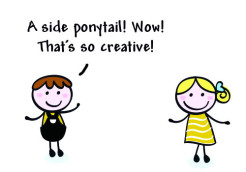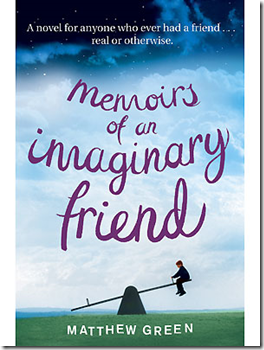In a a piece entitled How to Talk to Little Girls, Lisa Bloom writes:
Teaching girls that their appearance is the first thing you notice tells them that looks are more important than anything. It sets them up for dieting at age 5 and foundation at age 11 and boob jobs at 17 and Botox at 23. As our cultural imperative for girls to be hot 24/7 has become the new normal, American women have become increasingly unhappy. What's missing? A life of meaning, a life of ideas and reading books and being valued for our thoughts and accomplishments.
I like what Lisa Bloom has to say a lot.
As an elementary school teacher, I have made it my policy for more than a decade to avoid commenting on a student’s physical appearance for similar reasons. A student’s appearance should be the last thing of concern to a teacher, but more importantly, these comments, even when positive, can be damaging and hurtful to kids.
A few years ago, just prior to a performance by the school’s choir, I watched a teacher compliment a young man on his appearance. The boy was wearing an impeccable suit and tie, and even his dress shoes gleamed in the dull glow of the hallway’s fluorescent lighting.
The teacher doing the complimenting was aware of my "no commenting" policy, and after praising the young man, she turned to me and asked how her complimentary words could ever be construed as hurtful to the child.
 I pointed out to the teacher that while the young man was probably feeling great about her compliment, the boy to his left and the boy to his right, who were not wearing suits and had not received a similar compliment, and who were perhaps from families who could not afford suits and ties and gleaming dress shoes for their boys, might be feeling very differently as they take the stage.
I pointed out to the teacher that while the young man was probably feeling great about her compliment, the boy to his left and the boy to his right, who were not wearing suits and had not received a similar compliment, and who were perhaps from families who could not afford suits and ties and gleaming dress shoes for their boys, might be feeling very differently as they take the stage.
Therein lies the danger.
As one who grew up in relative poverty, I know how it feels to hear your classmates and friends receive compliments for their appearance while you do not.
Worse, I know how it feels to receive the compensatory compliment from a teacher who suddenly realizes that he or she has probably made you feel lousy while gushing over the appearance of your best friend.
There are simply too many other things worth complimenting for any educator to be discussing physical appearance. Effort, sportsmanship, empathy, helpfulness, rigor, respect, friendship and charity are just some of the areas in which teachers can offer meaningful, productive comments.
Not to mention that a student’s choice of clothing and haircut, especially in elementary school, are often not entirely within the child's control. Oftentimes a teacher’s compliment about appearance amounts to little more than a comment on how the student’s parent chose to send their child to school, making the words even less meaningful.
So ten years ago, I decided to stop commenting on students’ physical appearance, and I have held the line ever since.
It hasn’t been easy.
A girl walks into my class with a new haircut and asks me what I think.
I say, “I don’t know about your hair, but I love the way you use that brain underneath your hair to solve math problems.”
A boy walks into class with a new shirt promoting his favorite basketball team and asks me if I like it.
“I didn’t really notice the jersey,” I say. “But I noticed the way you played kickball yesterday. You were a great sport. Good job.”
Sometimes these exchanges are a little awkward, and sometimes the kids think I’m a little crazy, but I would choose awkward and crazy over the alternative.
In order to counter the furrowed brows and confused stares, I have made it a habit to tell my students about my policy now, and in ten years, I have never had a student disagree with my rationale or debate my decision. In fact, almost every student responds positively to my policy.
Nevertheless, I have been told by many educators and parents that my policy is unrealistic and unnecessary. They typically bolster their arguments with statements like, “My teachers complimented me when I was a kid and we survived” and “These kids are going to hear compliments for the rest of their lives, so there’s no reason for us to be sheltering them now.”
These types of arguments boil down to this:
If it worked for me, it should work for them.
These are people who did not wear the same pair of sneakers through three New England winters while in middle school.
There are people who did not receive the majority of their childhood wardrobe from their much older, much larger cousin.
These are people who are unable to place themselves in the shoes of a student whose shoes will never gleam in the dull, florescent light of a hallway.
These are people who believe that you need not do what is right if everyone around you is doing otherwise.
These are people who do not believe that one person can make a difference.
From tiny acorns mighty oaks grow. That means someone needs to be an acorn. As awkward and crazy and divergent as that acorn may seem, someone must take the first stand.
Don't tell me that my policy is foolish because no one else adheres to it.
Don't tell me that my policy is useless because everyone else in that child's life will comment on physical appearance.
Change often begins with a few lone voices, and it turns out that I am not alone.
In a piece entitled One Hundred Things Restaurant Staffers Should Never Do, Bruce Buschel writes:
42. Do not compliment a guest’s attire or hairdo or makeup. You are insulting someone else.
This is a man who understands the inherent hazard of a compliment, particularly when it addresses physical appearance.
In the end, regardless of whether or not you believe that physical appearance should be a matter of discussion with students, there are far too many more important things to comment on during the course of a school day for me to waste an ounce of breath or a second of time on a student's dress or hair style or shoes.
I am too busy on a minute by minute basis helping children attain the skills they need to be successful in the future to waste a single moment on the way they look.




